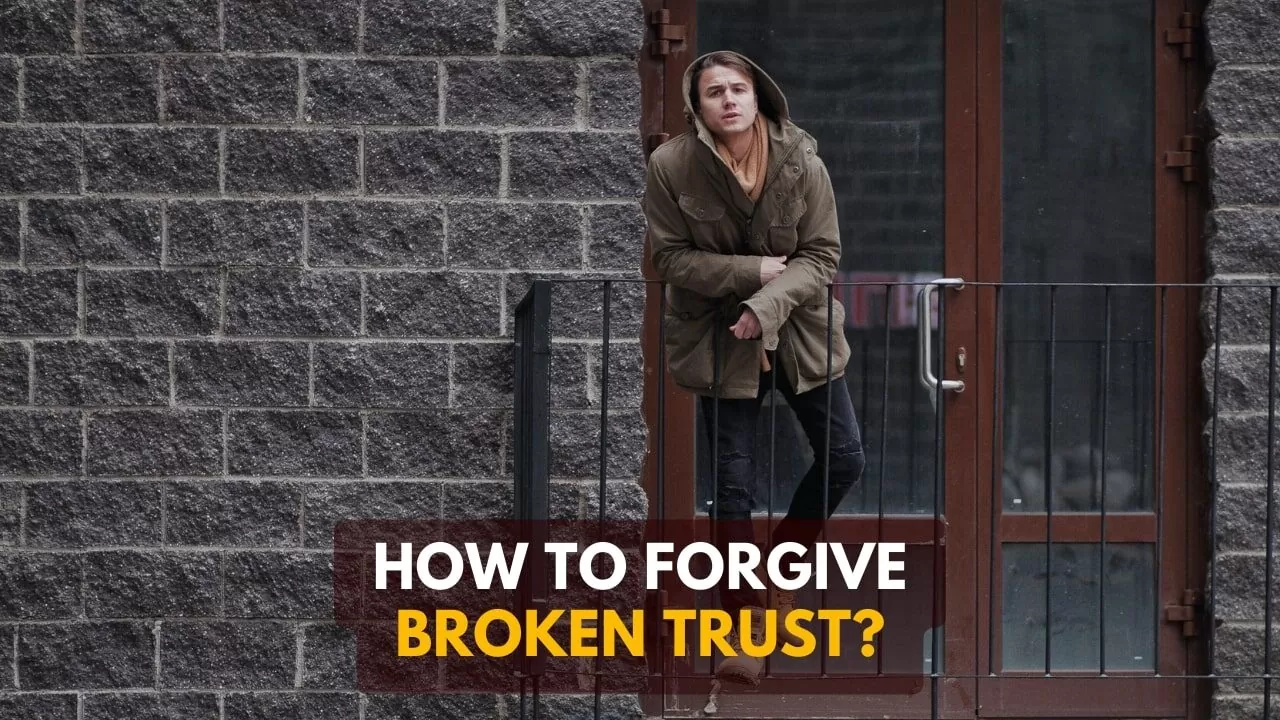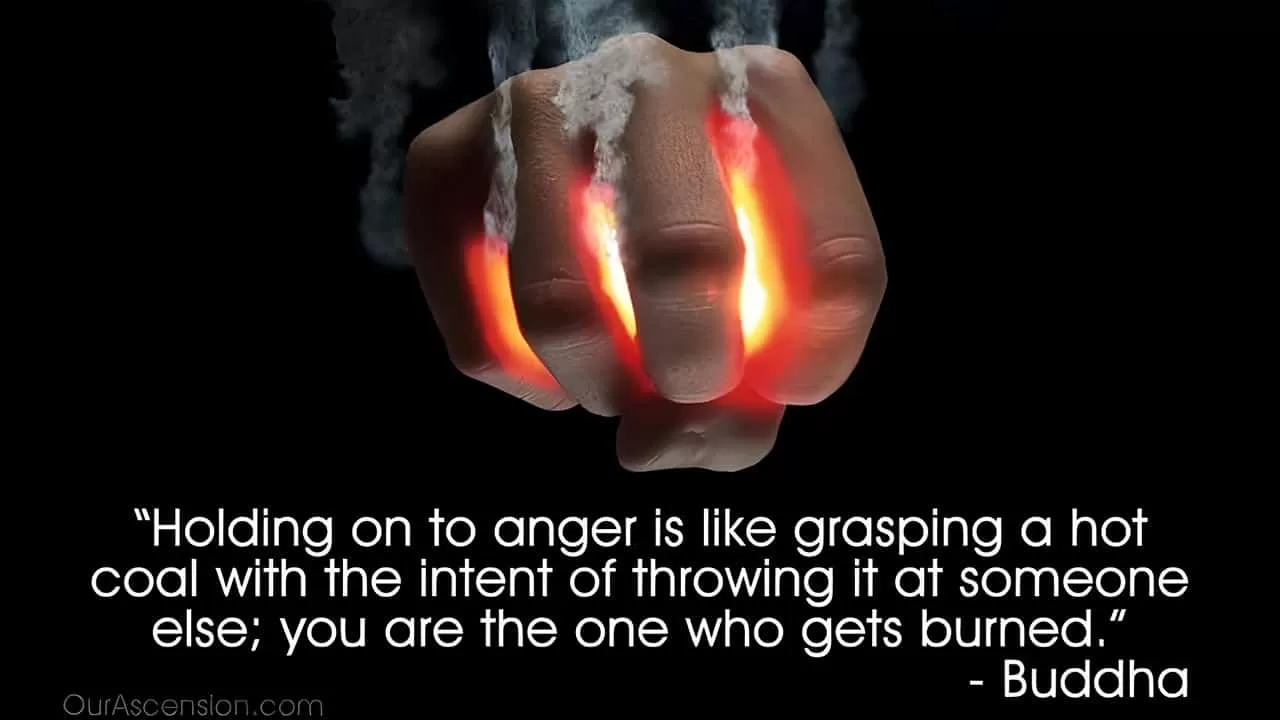Today's Monday • 13 mins read
— by Dr. Sandip Roy.
Trust has been a human necessity since prehistoric times.
It helped us survive critical times and build communities. We became the most accomplished species because we had each other’s backs.
But, do we need trust in today’s world? Our modern societies are safe. We have self-learning robots replacing human roles, built on the Three Laws of Robotics (more on this later).
Moreover, trust has a weakness — once broken, it doesn’t return the same way. Even if they were someone you deeply loved and cared for.
The main way to move on is to forgive them without condoning their acts. Only then can you trust another person with your weaknesses.
How to forgive someone who broke your trust

To forgive someone who violated your trust, and move on, follow these steps:
1. Redefine forgiveness as throwing them out.
Forgiving is hard when you see it as letting go, but easier when you see it as forcing them to leave.
Throw the offending person out of your mind.
Don’t let them live rent-free in your mind.
When you forgive:
- they no longer occupy your headspace and pollute your other thoughts,
- you replace your dark emotions with better emotions,
- you no longer waste your time overthinking their act,
- you free yourself from the weight of grudges,
- you decide to stop wanting to punish them.
Forgiveness is not about the other person. It’s about you. You are letting go of your pain, your anger, and your grudge.
As they say, the best revenge is to live a happy life. Forgiving is giving yourself the green light to do those things that make you happy.
Your forgiveness is for you, so find ways to forgive them.
Forgiving does not mean:
- forgetting the act,
- having to make up with them,
- telling them that you forgave them,
- allowing them future breaches of trust.
Throw them out of your mind without worrying if it will relieve them of their guilt or shame.
Even if they broke your trust when you least expected them to, forgive them. You deserve the peace.

2. Sit with your hurt feelings.
Accepting the difficult emotions resulting from the betrayal of trust is part of the forgiveness process.
“Sitting with your difficult emotions” means allowing yourself to feel the difficult emotions without judging or resisting them.
Sitting with your emotions can strengthen them at first, but then it allows you to learn to accept them, and finally move on.
Here are a few tips on how to sit with your difficult emotions:
- Find a quiet place where you won’t be interrupted.
- Close your eyes and take a few deep breaths.
- Pay attention to the physical sensations in your body. Where do you feel the emotion in your body?
- Name the emotion. What emotion are you feeling?
- Allow yourself to feel the emotion. Don’t try to push it away or judge it. Just let it be.
- When you are ready, open your eyes and continue with your day.
The truth is, what happened was wrong, and it hurt you deeply. Now you have to process those emotions that resulted from it.
- Do not suppress your emotions or ignore their presence.
- Resist the urge to do things to distract you, or numb yourself with abusive substances.
You could write about your feelings to express your emotions. It’s called expressive writing therapy, and it can help you better process what happened.
Talk to a therapist to sort out the hurt you felt when someone you trusted too much let you down.
3. Be willing to listen, and be flexible.
When the trust-breaker is genuinely sorry and asking for your forgiveness:
Be willing to listen to them and be flexible in your next steps.
Listen to them as they open up about what made them do it. Let them express genuine regret for their actions, and have a sincere plan to change for the better.
Being flexible means you allow them the benefit of the doubt and feel that they will redeem themselves if given a second chance.
Perhaps:
- they did not know it equaled betraying your trust,
- they had acted without realizing it would hurt you,
- they had been let off earlier without consequences.
If you aren’t sure about forgiving them truly, grant them conditional forgiveness. It may mean receiving an apology, seeing genuine remorse, or being offered compensation for the harm done.
A simple way to do it is to accept their apologies but keep a watch on their future behavior. If they prove themselves, you may resurface your positive feelings for them.
Gradually, both of you may learn to see past the hurt.
Remember, everyone can learn and grow from their mistakes, and this process often brings about the most profound changes.

4. Stop blaming or punishing yourself.
You wouldn’t eat your food from the floor if a thief were to steal your plates, right?
Self-blame and self-punishment for someone else’s fault are similar — foolish ways to take revenge.
They stop you from moving past someone else’s hurtful act and slow down your journey to forgiveness.
So, stop blaming or punishing yourself for what they did — you aren’t responsible for their actions. Instead, be your own friend.
Focus on the positive things about you and your life. Shift your attention to your strengths and the good parts of your life.
Always remember, your value doesn’t decrease based on someone’s inability to see your worth.
Your strength lies in rising above the hurt, learning from the past, and moving forward with grace. Healing is not an overnight process, but with patience and self-love, it’s entirely achievable.
In your journey of self-healing, keep reminding yourself that you are not to take blame for another’s mistakes.
Allow yourself to trust other people. Trust becomes stronger when you feel confident about showing your vulnerabilities.
That said, beware of people who might take advantage of your trust.
People like narcissists can betray your trust and then shift the blame onto you. This victim blaming is the cruel behavior of even vulnerable narcissists.
5. Remember their actions.
Please remember: Forgiving them does not mean forgetting what they did.
When you forgive someone, it doesn’t mean you erase the memory of what they did. It means you have chosen to let go of your negative feelings.
Do not hold on to the pain they caused — but remember their actions.
Remembering what happened safeguards your future mental well-being. It serves as a guide to lay your trust in better people in the future.
While forgiveness lightens your emotional load, it also provides valuable lessons. You become wiser, free yourself from bitterness and resentment, and move forward.
First offense, you can forgive them. Second time, stop trusting them with big things. In any case, don’t let them break your trust a third time.
“Forgiving is not forgetting.”
6. Consider their past trustworthiness.
Trust is presumptive in nature.
It means we presume that people who have been trustworthy in the past with others will continue to be trustworthy with us in the future.
While it is often a good possibility that people maintain their nature, it is often naive to believe that “a king’s trustworthy minister will be trustworthy to the king’s subjects.”
Another truth is that even if a person was completely trustworthy in the early days of your relationship, they will slip up sometimes later on.
They may stop fulfilling your expectations of trust when you have known each other for some time.
What is trust?
Social psychologist Morton Deutsch defined trust as the “confidence that one will find what is desired from another, rather than what is feared”. Most researchers think trust is a state or attitude that can change depending on circumstances and people.
Why is trust important in a relationship?
Trust is vital for relationships to thrive, but not everyone has the same ability to trust others.
Researcher Jane Penaz Eisner says that trust is a trait in close relationships, that is, it is stable over time and consistent across different relationships (Eisner, 1992).
She found that dispositional trust (“the tendency to believe that others will behave in a trustworthy manner”) importantly influences friendship formation. She lays out the three dimensions of trust as: predictability, dependability, and faith.
While introducing the Interpersonal Trust Questionnaire (ITQ) in her Ph.D. dissertation, Eisner said,
“Departing from current state approaches, I argue that (1) trust in close relationships is a trait, and (2) dispositional trust importantly influences friendship formation.”
– Jane Penaz Eisner, Interpersonal trust in close relationships
People who score high on the ITQ (Interpersonal Trust Questionnaire) are more likely to form friendships, more likely to believe that their friends are trustworthy, and more likely to disclose personal information to their friends, than those who score low.
These findings suggest that trust is an important factor in close relationships, and that dispositional trust may play a role in friendship formation.
We are here today studying our minds and brains because our forest-dwelling ancestors laid down the first rules of mutual trust. That mutual trust keeps modern humans secure from physical, mental, and emotional harm.
Researchers Larzelere and Hudson found that when one person in a romantic relationship trusts the other, they base it on:
- Benevolence – whether the other person is interested in their good or merely seeking their own gain, and
- Honesty – whether they can believe in their declared intentions.
Three Laws of Robotics
The Three Laws of Robotics are a basic set of rules to guide the behavior of robots. Devised by famous science fiction author Isaac Asimov, they are:
- The First Law: A robot may not injure a human being or, through inaction, allow a human being to come to harm.
- The Second Law: A robot must obey the orders given it by human beings, except where such orders would conflict with the First Law.
- The Third Law: A robot must protect its own existence as long as such protection does not conflict with the First or Second Law.
Later, Asimov introduced a “zeroth law” that states “a robot may not harm humanity, or, by inaction, allow humanity to come to harm,” which supersedes the original three laws.
FAQs
Should you forgive someone who broke your trust?
Forgiving is taking a strong and mature approach. It allows you to move forward.
Can you forgive someone but not trust them again?
— Forgiveness is about letting go of the pain and resentment for your own peace of mind. It’s a personal journey of healing that does not need to involve the person who broke your trust.
— On the other hand, trusting again is about confidence in the trust-breaker’s reliability and honesty in the future.
What is it called when someone breaks your trust?
It may also be called infidelity (being unfaithful in an intimate relationship), treachery (betrayal of trust in an underhanded manner), back-stabbing (deceiving someone who deeply trusts you), double-dealing (deception or duplicity), and treason (betrayal of one’s country or government).
What do you say to someone who betrayed your trust?
“You’ve deeply hurt me, and you need to understand that.”
“Your actions have made it difficult for me to trust you again.”
“I need some time and space to heal and process what happened.”
“It’s essential for us to have a candid conversation about what led to this betrayal.”
“Trust is the foundation of our relationship, and it needs to be restored for us to move forward.”
“If we’re to rebuild our relationship, it will require honesty, transparency, and sincere efforts from your side.”
“I am open to forgiveness, but it doesn’t mean forgetting what happened. We need to learn from this situation.”
“In the future, let’s prioritize open communication to prevent such instances of betrayal.”
How can someone lose trust in you?
Research by Holmes, 1987, found distrust in marriages is marked by:
1. perceptions of neglect by the other partner, and
2. perceptions that the other person is trying to control the relationship.
Some typical causes for someone to lose their trust in you include: Breaking rules, boundaries, or commitments, showing disrespect, attacking or abusing, or not being open and honest, or dependable.
How to build trust through communication?
1. Prioritize listening over speaking.
2. Use open-ended questions to gain deeper insights.
3. Use phrase-reflections to confirm that you understand.
How many types of forgiveness are there?
1. Exoneration: Involves wiping the slate clean entirely, restoring the relationship to its original state. It is the same as forgiving and forgetting, allowing for a fresh start without holding on to past grievances.
2. Forbearance or Conditional Forgiveness: Involves exercising tolerance and self-restraint when a partial or inauthentic apology is offered, or when blame is mingled with an apology. It allows for maintaining ties with imperfect individuals.
3. Release: Release is the most challenging form of forgiveness. It involves letting go of negative feelings, but without exonerating the offender. It is applied where there is no acknowledgment of hurt, insincere apologies, or no attempts at reparation.
4. Dismissive Forgiveness: This type offers the greatest benefit to the forgiver and the least to the forgiven. It involves dismissing the offense without addressing it directly, allowing the forgiver to move on without dwelling on past hurts.
- Find out what are the 17 Things That Narcissists Do When Relationships End.
Final Words
Let’s close this with 3 quotes:
- “That’s the thing about trust. It’s like broken glass. You can put it back together, but the cracks are always visible–like scars that never fully heal.” — Hope Collier
- “Trust is like that. You can break it for a good reason. But it still remains broken.” — Harlan Coben
- “Breaking someone’s trust is like crumpling up a perfect piece of paper. You can smooth it over but it’s never going to be the same again.” — Unknown
√ Also Read: How To Rebuild Trust After Cheating?
√ Please spread the word if you found this helpful.
• Our Story!
